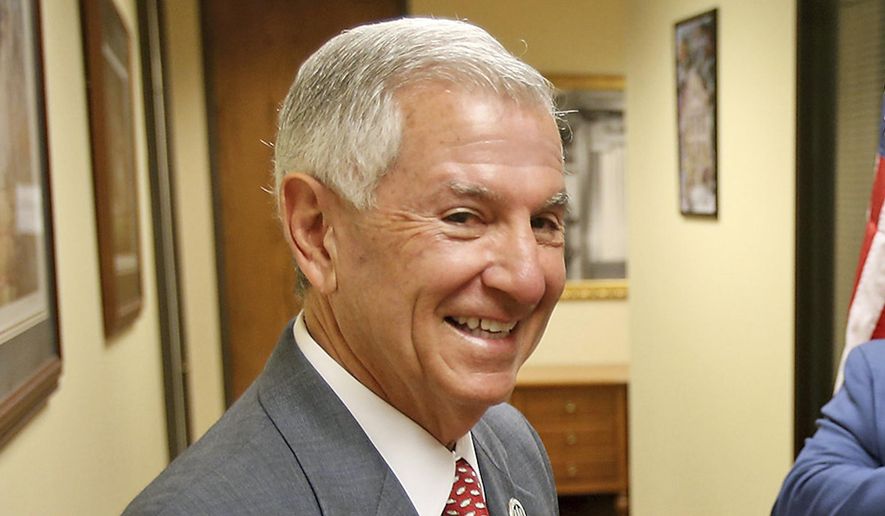The top three candidates competing for Louisiana’s governor’s mansion will square off Thursday in the first of three scheduled debates that will give many voters their first look at the two Republicans looking to unseat Democratic Gov. John Bel Edwards.
The incumbent is a familiar figure, but the debates will offer both the two challengers, GOP businessman Eddie Rispone and Republican Rep. Ralph Abraham, an opportunity to boost their profiles one month before the election.
“They have to make a good first impression,” said Ed Chervenak, a longtime Louisiana political analyst at the University of New Orleans who recently joined a private research firm. “They definitely need to bring up their name recognition, and this will be the first time they are standing on equal footing with the governor.”
In addition to introductions, the debate could turn combative. Mr. Rispone, the Baton Rouge businessman who is making his political debut in this race, launched across-the-board attacks this week, dipping into the $11.5 million personal loan he made to himself to underwrite his campaign.
Trailing Mr. Edwards and Mr. Abraham in most polls, Mr. Rispone directed fire at both.
First, Mr. Rispone went after the governor on crime.
Like many jurisdictions across the country reassessing criminal justice practices, Mr. Edwards and the state’s Republican Legislature eased some of the stiff prison time Louisiana famously dishes out to its criminals.
Some of those released are now recidivists, even standing accused of murder in some cases, and Mr. Rispone’s ads accuse the governor of failing the state in terms of public safety.
“Dangerous. Sick. Violent. John Bel Edwards put them back on our streets and they struck again,” the short ad declared over a montage of mixed race mug shots. “John Bel Edwards is releasing dangerous criminals and we’re paying the price.”
The Edwards campaign immediately responded, putting together an ad the next day that featured myriad parish sheriffs and district attorneys who have endorsed the governor and attested to his law-and-order bona fides.
Then, Mr. Rispone broke what GOP insiders hoped would be a inside-party truce leading up to the Oct. 12 primary by going after Mr. Abraham, whose 5th District runs along Louisiana’s eastern border and down to where the laces would tie on its boot shape.
Mr. Rispone’s ad faults the congressman on a variety of issues, from voting with House Speaker Nancy Pelosi, California Democrat, to not supporting a border wall funding bill.
Republicans were aghast at the move, with House Minority Whip Steve Scalise taking to the radio Wednesday to urge conservatives to stick together. Mr. Scalise has not endorsed either GOP candidate, but in the aftermath of the Rispone attack, a number of state conservatives have publicly come out for Mr. Abraham.
Fighting between the two GOP challengers could provide Mr. Edwards with his best chance of hitting the 50% plus 1 threshold that would give him an outright reelection victory in October — allowing him to dodge a November runoff against a presumably united Republican Party.
Louis Gurvich, the state GOP chairman, had issued a dual endorsement of Mr. Abraham and Mr. Rispone, but some pressure appeared to be building Wednesday to throw the weight of the party behind Mr. Abraham.
For the most part, the Abraham campaign has tried to stay out of the fray, just as it did on the crime issue, simply noting that all members of Congress vote on hundreds of routine bills together and that his complaint with the border wall was that he wanted more money for it.
“It’s sad that my Republican opponent felt like his only option was to create an ad full of baseless personal attacks that he knows aren’t true,” Mr. Abraham said on Facebook. “This is literally the playbook that got John Bel elected four years ago. We will continue to turn a race aimed solely at John Bel, based on ideas and principles that are best for Louisiana.”
Instead, Mr. Abraham has focused recently on the troubles that have plagued Mr. Edwards’ decision to expand Louisiana’s Medicaid rolls through Obamacare. The expansion has been dogged by eligibility and cost issues, and while the governor touts it as his best accomplishment, Mr. Abraham contends it is a fiscal calamity.
The three debates the candidates have agreed to prior to primary day means Louisiana voters will have a much greater chance to judge their choices than their counterparts in neighboring Mississippi, where the gubernatorial contest there currently has just one debate scheduled.
Mr. Edwards’ goal will be painting his opponents as a return to the two terms Bobby Jindal served as governor.
Facing a relentlessly hostile media and bedeviled by then-Sen. David Vitter’s attempt to establish his own Republican power base to make a run at governor, Mr. Jindal’s tenure ended disappointingly with Democrats claiming Louisiana faced horrific deficits.
Presenting himself as a moderate Democrat who could balance the books without raising taxes, Mr. Edwards won an upset victory over Mr. Vitter in 2015.
Since then, however, Mr. Edwards has relied on multiple increases in the sales tax and other areas to plug what was always an exaggerated deficit, according to Mr. Abraham and Mr. Rispone.
“Basically, he wants them to be seen as Jindal-point-two,” Mr. Chervenak said of the governor’s debate approach. “The governor wants people to think they are either voting for a return to the ’bad old days,’ or a continuation of what he presents as his own steady, competent leadership.”
• James Varney can be reached at jvarney@washingtontimes.com.




Please read our comment policy before commenting.